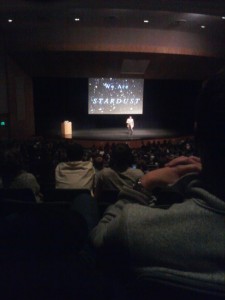Neil deGrasse Tyson visits Vanderbilt
This Tuesday, November 13, world-renowned astrophysicist Neil deGrasse Tyson graced Vanderbilt with a visit and a public seminar. Publicly famous for having been the first to make known his disbelief in Pluto as a Planet, Neil deGrasse Tyson works as the director of the Hayden Planetarium and for the American Museum of Natural History. The Vanderbilt Programming Board invited him to give a speech at Vanderbilt!

His speech was both inspiring and comedic as he prolonged his scheduled 45 minute seminar to nearly 2 hours (luckily for us in the audience)! His lecture was based on the “10 Things Everyone Should Know about the Universe.” Here’s a summary of his lecture…
10. The Universe Has a Shipload of Stars — 10^21 stars to be exact. Neil deGrasse Tyson led us through the prefixes of standard units of measure so that we could fully comprehend how many stars that was.
9. The Universe Is Bad for Your Ego — We are not the center of our solar system, let alone our galaxy, supercluster, or the universe. And oh yeah!…our universe might not even be the center of the multiverse.
8. The Universe Is Like a Time Machine — The light we see from the sun is from 8 minutes ago and the light we see from those stars can be billions of years old.
7. The Universe Is Big, Molecules Are Small — And because of this, each of us most likely shares molecules with famous dead people like Socrates, Abe Lincoln, and Joan of Arc.
6. The Earth Wants to Kill You — Think of all of the natural disasters out there and the fact that 95% of all species to ever roam Earth are now extinct.
5. The Earth Might Not Be the Origin of Life on Earth — Perhaps those extremophile bacteria that can exist is super unfriendly environments (high heat, high acidity, radiation, etc…) actually came to us from a meteorite from Mars or somewhere else where those conditions exist.
4. Carbon: Life as We Know It — Carbon will bind with anything, it is the perfect element to make up life.
3. Life Is of the Universe — The elements that are most abundant on Earth are also most abundant in the universe (except for helium).
2. The Universe Is of Life — When stars die, they spew out elements to the rest of the universe.
1. We Are Stardust
Thanks Vanderbilt for bringing in such awesome people to speak to us!
